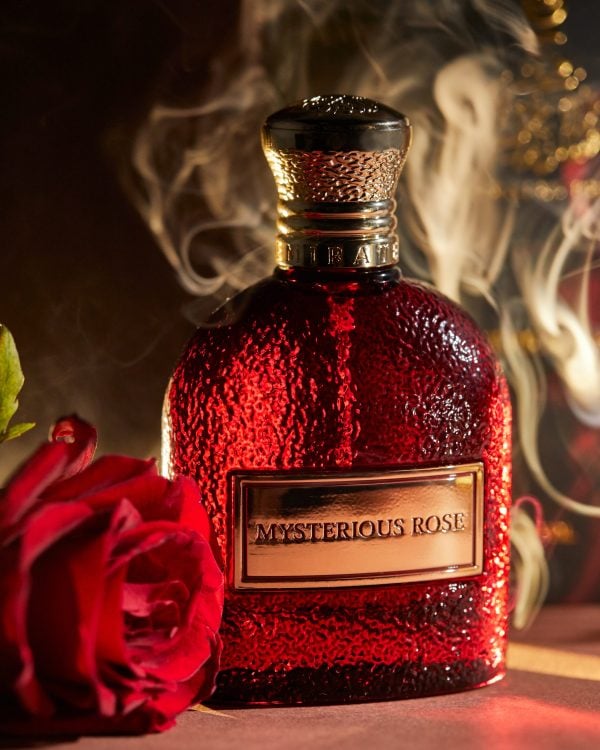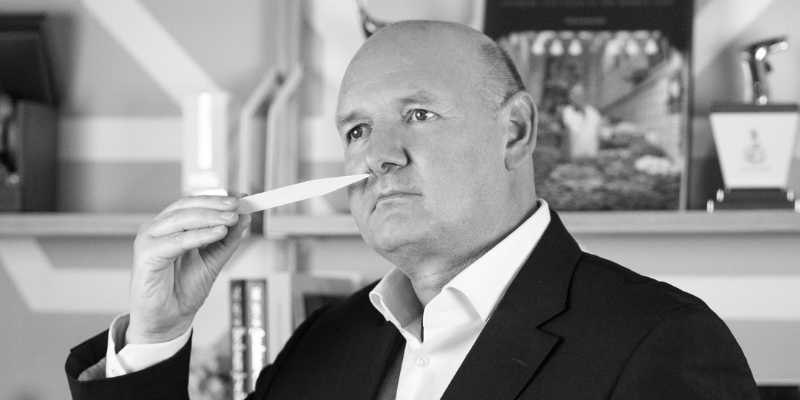It’s a fact that there are more astronauts on earth than there are perfumers, with only 500 living perfumers, the knowledge of this art is rare.
Hamid Merati-Kashani is one of the few expert “noses” in the industry, having specialised in this art for over three decades.
Hamid has been in the industry for 34 years and is Principal Perfumer at Firmenich. He is likely to be the nose behind some of your favourite fragrances ranging from; Carolina Herrera, Jean-Paul Gaultier, Valentino, Yves Saint Laurent, Michael Kors, and niche fragrance brands such as Parfums de Marly, Initio Parfums Prive, Fragrance du Bois, and Emirates Pride.
Born in Germany to a German mother and Iranian father, he moved to Iran where his family lived until the end of 1979 when the revolution in Iran started when they relocated back to Germany. Which as fate dictates is where Hamid’s fragrance journey began. In the little German city where the Kashani family lived were two fragrances houses competing against each other, which eventually merged to create what we now know as Symrise. Most of those living in the city started their career in one of the two fragrance houses.
Did your childhood have an impact on your decision to become a perfumer?
My name is an Iranian name and Merati means; ‘the mirror maker’ and Kashani is the name of the city where my grandfather came from. The town is famous for its beautiful carpets but also for its rose fields. You see the freshness in the morning, the dew on the roses and you see how people pick them. For something like 5 million petals picked, you only get half a kilo of oil for your work. I was fascinated by the love in this kind of production, very simple, nothing special but impactful.
What training did you undergo to become a perfumer?
When I finished school, I started in chemistry in one of the fragrance houses, Dragoco. I spent 12 years there and had the privilege of going through their perfumery school. They had hired a retired senior perfumer, Robert Calkin to teach us how to smell and how to create fragrances, and more.
What inspires you for your creations?
I like to express myself my feelings and the feelings I get from others. I’m very interested to receive comments from people on what they like and how fragrance makes them feel. It affects your mood too, when I see people sad or uncomfortable, I try to bring happiness to them through what they smell or what fragrance they choose to wear.
What do you need to succeed as a perfumer?
You need passion because you need to bring your passion into the fragrance. If you don’t have that passion, you will not be successful. As a perfumer, you live fragrance, sleep fragrance, eat fragrance and you smell fragrance every day. Somehow 24 hours, 7 days a week you are connected to fragrance, and you cannot switch off.
What are some of the benefits of working as a perfumer in Dubai?
I’ve lived in Dubai for 12 years by chance, this has given me the opportunity to work more in niche fragrances. These are very special; you use ingredients not found commercially and the fragrances have to be much stronger and longer-lasting. With that, you can express your feelings more and be a little more creative.

What is special about the Middle East when it comes to fragrance?
Clients in the Middle East like this kind of creativity, bespoke fragrances created for them, or exclusive and limited-edition scents. This is why I work more in the niche field now. In this region, there is no gender when it comes to fragrance, men use women’s fragrances and women use men’s fragrances. So, I came up with the idea to twist a feminine fragrance into a masculine one, it was my very first niche fragrance; Pegasus for Parfums de Marly.
What trend have you seen in fragrance this year?
Edible fragrances because I believe we are going through this very difficult time. In life, there is always sun after the tunnel, and right now we are in the tunnel but I think we already see the sun. As humans we like sweet notes as they are slightly addictive and provide comfort; we smell them to escape and with the pandemic, we are searching for happiness. Gourmand fragrances with notes like vanilla, caramel, and even liquorice often remind us of happier times and that is where I have seen a trend.
How do you judge the success of one of your creations?
I like it when people get compliments. I like it when people say that they have received compliments wearing one of my fragrances. It shows me that what I created didn’t fail.
What is your signature creative style?
I like to overdose. I like to overdose on ingredients that smell nice. I like to use much more than you usually find on the market and that is what makes my fragrances a little bit different from others. I like to create strong fragrances as they smell good and are long-lasting.
What’s the difference in creating for niche and commercial brands?
Larger companies are testing before launching as well. As they want to make sure people will like it and purchase it. What I like, personally, in the niche fragrances is that the person who owns the brand decides from their heart, they essentially say: ‘I like it, I love it. I believe in that fragrance, and I want to launch it.’
If someone has a signature fragrance, should they try to have a fragrance wardrobe instead?
If you like the fragrance wear it. Don’t wear something which other people like. You can always try other fragrances, but you will usually go back to the one you had as your signature.
What advice do you have for those looking for their next fragrance?
We have the tendency always to be in our comfort zone. So, try something else; if you are using gourmand fragrances, maybe try some nice floral and fresh fragrances.
– For more on luxury lifestyle, news, fashion and beauty follow Emirates Woman on Facebook and Instagram
Images: Supplied











